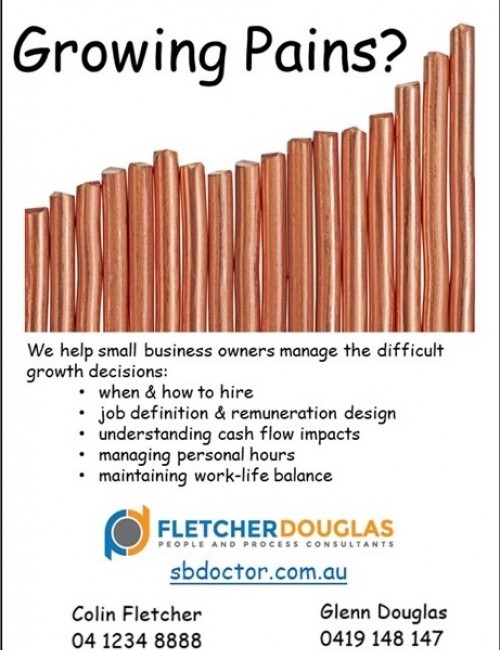
Strategic Areas to Improve Work Life Balance for Tradies
Glenn Douglas Director Fletcher Douglas People & Process Consultants | 21 Jan 2022
Work Life Balance is possible although, at times, it is something that seems quite out of reach. One of the most common misconceptions is that time is money - and the more time spent working results in more money and greater happiness. Not true!
If working long and demanding hours were the only requirement for success, then every person has the potential to be Sir Richard Branson or Kerry Packer. The truth is that many business owners and trades people have neglected facing one important fact - what does Work Life Balance mean for you?
What Does Work Life Balance Mean for You?
The desire, target or goal will be different for every individual. The key to achieving Work Life Balance relies on not just what you do while you’re working (doing meaningful work, finding purpose in your work) but what you do outside of work. Whether it is a sport, hobby, interest or passion, most people work to engage in activities of enjoyment, not just to accumulate money. Again, it is important to be clear on what Work Life Balance is for you.
Considerations include:
• Am I doing what I want to be doing?
• Am I satisfied with what I am doing?
• Am I earning sufficient money, and how much is enough?
• What do I want to do with time and how much free time do I want?
• Is this what I want to be doing for the next five years?
• Why did I go into business in the first place?
• What are the things I enjoy doing when not working?
• Who are the most important people in my world?
• Am I comfortable with who I am?
The answers to these questions help frame what the present and future look like and the areas that require focus. They define how control can be increased.
When money and time are out of control, often the next to be impacted is relationships, both personal and professional. The inherent stress from fractured relationships starts to impact on health, satisfaction, and contentment, often leading to people asking the rhetorical question - What the hell is life all about?

5 Strategic Areas to Achieve Work Life Balance
Once you have your head around the questions mentioned above, it’s time to consider control. Control can be gained or salvaged by implementing strategies, each designed to increase focus on whatever it is that is currently out of control.
Our strategies fall into 5 key areas. Importantly, small steps are recommended to gently change your existing habits and build from there. So, focus on just one area at a time. Once you’ve spent some time (maybe a month or two) on that, reassess and adjust your focus.
1. Vision
All businesses start with a vision of some description, but in many instances, as time continues, the vision becomes blurred.
To correct this, we recommend you write down what you want out of your business. It’s not easy, but the best approach we’ve found is to list what you want the business to look like in 3 years’ time and then align your business activities accordingly. For instance:
• What services will you be offering, to what geographic area? How will your business stand out from competitors?
• How many customers and staff will you have? What revenue and profit should it be delivering?
• What business activities will you be doing personally? What can you delegate? How many personal hours a week will you be working?
2. Money
A common danger for individuals and businesses is an obsession with money rather than planning.
Have you figured out how much money is enough? You may have a focus on income, or on the growth in value of your business. Either approach works, but a clear view of your financial intentions enables a better business plan to be built.
Again, small steps are fine. Your 3-year business plan should include a clear set of targets that head in the desired direction. That plan should be reviewed regularly (at least yearly) to check that the outcomes are in line with expectations, and the following 3 years can then be mapped out.
3. Time
Time isn’t always money. It can be other things as well – that’s the point of Work Life Balance.
Within the business, you need to think about the activities that take up your day. Are you spending your working time on the things that most benefit your business? What things are more urgent or important than others?
What work activities can you delegate? Delegation frees up your time and gives someone else an opportunity to grow.
What do you want to do with your free time? And how much free time do you want? Your 3-year plan should allow for a commitment you can make to yourself about free time and how it will be used. That includes fam
ily time, hobbies, exercise, yoga, whatever.
4. Relationships
Who are the most important people in your world? Are you giving them enough attention? Some of these relationships may be connected to business, some to your home life, and some may be connected to hobbies and other interests.
What are your priorities for each of those relationships? Make sure they’re your priorities and not someone else’s. Their expectations of you will vary for each person, but we’re pretty sure it’s not just about money.
Carving about specific time commitments to meet those expectations will result in a more gratifying existence for everyone.
5. Self – Contentment
People all over the globe have strengths and weaknesses. No matter how hard some try to turn a weakness into a strength, the best it might become is a strong weakness.
Are you satisfied with how you are doing at work? Are you enjoying your work? What unpleasant activities (or areas of personal weakness) can you hand off to someone else?
What are the things you enjoy doing when not working? Do you have control over them, or are you living up to someone else’s expectations? It’s important to occasionally stand back from your own life to get a better perspective.
You may have fallen into habits (whether in your business or your free time) that need to be changed. Again, small steps are the best ones to allow better habits to embed.





